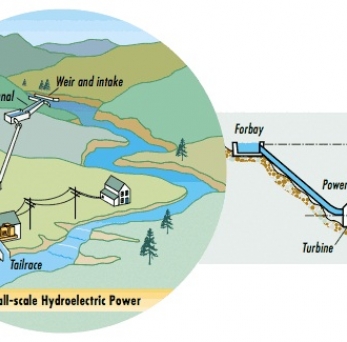
Programs
International Workshop on the Role of Micro-hydel For Developing Countries

Micro-hydels, in which water from a river tributary or water springs is diverted into a channel and is brought down through a pressure pipe to run a generator for producing electricity, are set up in the off-grid mountainous areas. Micro hydro systems complement solar photo-voltaic energy systems because in many areas, water flow, and thus available hydro power, is high in the winter when solar energy is deficient. Electricity generation of micro-hydels is generally in the range of 5 kW to 100 kW. In certain circumstances, micro-hydro power can be more appropriate and profitable than other energy supply options. There are many micro-hydel installations in different parts of the world, particularly in developing nations which provide an economical source of energy without the consumption of fossil fuels. Micro-hydels not only bring light into people’s lives in the locality, but also give energy and water security to population, make people economically more stable, reduce the physical workload for women, enable the mechanisation of rural industries and lessen environmental damage from cutting wood for fuel and heat or harming aquatic fauna and flora. Moreover, no waste by products are produced unlike the energy generation based on fossil sources. Many countries have begun to embrace micro-hydro technology as a viable and alternative source of energy, especially for remote and rural areas. There are different replicable success stories on micro-hydro based projects in many developing countries including Nepal. In order to explore the wider prospects and share the best practices on micro-hydel, the Centre for Science and Technology of the Non-aligned and Other Developing Countries (NAM S&T Centre) and the Nepal Academy of Science and Technology (NAST) in collaboration with Alternate Energy Promotion Centre (AEPC), Kathmandu, Nepal announce the organisation of an international workshop on ‘The Role of Micro-hydel for Developing Countries’ in Kathmandu, Nepal during 19-22 April 2013.
The overall objective of the workshop is to demonstrate micro-hydro technology, its implementation and sharing the success stories to explore replication of successful models among the developing countries. The workshop will provide a valuable platform for sharing of knowledge, transfer of technology and capacity building, coordination and networking among the experts and professionals of the developing countries.
The workshop will deliberate on various aspects of micro-hydels such as the potential and benefits of micro- and mini-hydels; micro-hydel turbines and their head range; site selection, microhydel installation, commissioning and maintenance; integrated approaches with other forms of non-conventional sources of energy; ecological implications; energy-societal-employment correlations; policy and planning issues;
training, etc.
In order to explore wider prospects and share the best practices on micro hydro, the centre for Science and Technology of Non-Aligned and Other Developing Countries (NAM S&T Centre) and Nepal Academy of Science and Technology (NAST) in collaboration with Alternative energy Promotion Centre (AEPC) announce the organization of an international workshop on ‘The Role of Micro Hydro for Developing Countries in Kathmandu during April 19 to 22, 2013. The international workshop will be participated by the delegates from 27 countries while around 35 experts, academicians and micro hydro professionals from Nepal will take part in the event.


